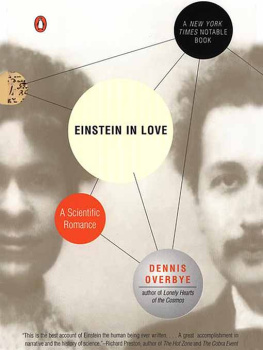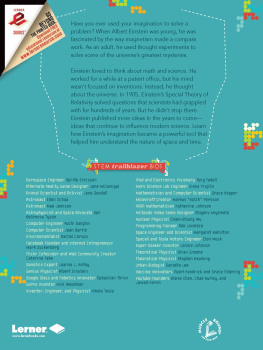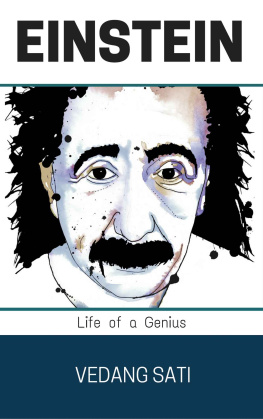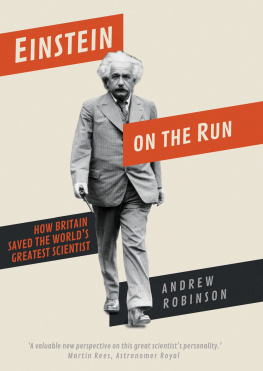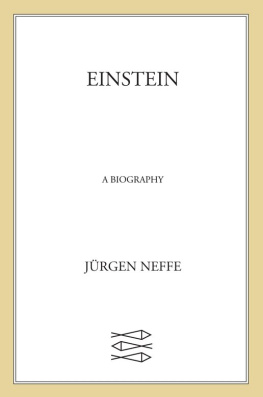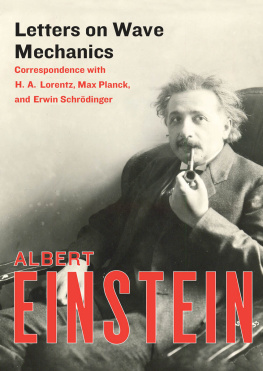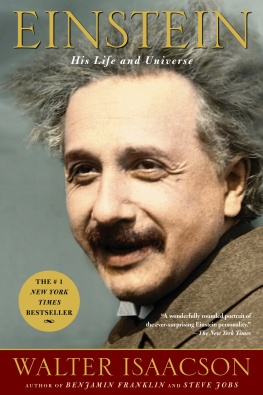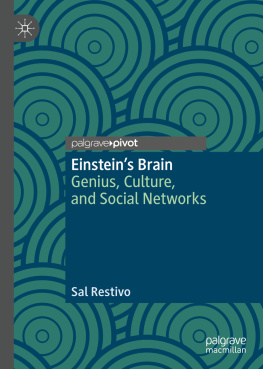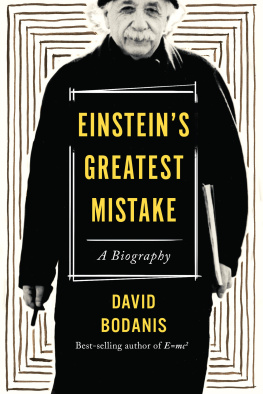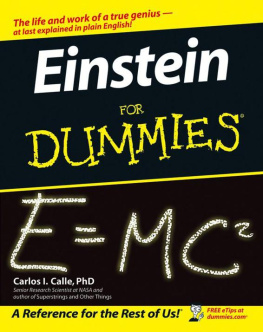Grateful acknowledgment is made for permission to reprint excerpts from the letters of Albert Einstein from the Albert Einstein Archives of the Hebrew University of Jerusalem and The Collected Papers of Albert Einstein. Copyright 1979-2000 by Hebrew University and Princeton University Press. Reprinted by permission of Princeton University Press.
Making or distributing electronic copies of this book constitutes copyright infringement and could subject the infringer to criminal and civil liability.
THE ROAD TO Splgen Pass climbs warily from the old Italian city of Chiavenna in a series of hairpin switchbacks and one-lane tunnels carved out of rock, up along Alpine cliffs. It passes from green forest shadows to a stony, bright, windswept summit and the Swiss border, all in a few exquisitely acrophobic miles. The road was first built by the Romans, and it feels as if it has barely been improved since then, with only a few flimsy-looking wooden posts serving as the hint of a guardrail between a swerving traveler and the abyss.
In the spring of 1901 Albert Einstein left home for the last time at the age of twenty-two and set off up that rugged landscape with his lover and former physics classmate, twenty-six-year-old Mileva Maric. They must have been a handsome couple, he with his glowing dark eyes, a scrum of fuzz on his upper lip, and stocky, stubborn build, striding cockily along, and Mileva, all cheeks and eyes, limping beside him like a determined little bird, both jabbering away about atoms and heat conduction, electricity, light waves, and the invisible, all-pervading aether.
It was the kind of heady moment every pair of young self-styled bohemians should have: Albert and Mileva were striking out at last from the tyranny of their families disapproval and the oppressiveness of narrow-minded teachers for the springlit slopes of new opportunity. On the other side of the mountains there lay, for Albert, his first postuniversity job, a modest teaching position that nevertheless offered the promise of a modicum of independence. For Mileva, studying for her second try at the university graduation exams that would certify her as a physicist, beyond the peaks was the prospect, after months of enforced separation, of a life with her sweetheart.
But there are no guardrails for the heart. The precariousness of the Splgen Pass road would prove an apt metaphor for the course that Albert and Milevas life together would take. For both, the trip would mark a turning point that would lead them down unexpected paths, entwining their lives forever. This book is, in part, an attempt to tell their storythe story of Albert and Mileva, or Johnnie and Dollie, as they affectionately nicknamed each othera tale entwined in turn with the history of science and the twentieth century, and still not well known or understood, despite the glaring celebrity of the man Albert eventually became.
As of this writing Albert Einstein has been dead for forty-five years, but in his absence he seems more present than ever. He remains the scientist most likely to make front-page newspaper headlines, as modern science confirms yet another of his bizarre-sounding hypotheses, published long ago. Within the last two years, astronomers have discovered that a strange repulsive force, known as the cosmological constant, which Einstein dreamed up in desperation while trying to explain why gravity didnt cause the universe to collapse in on itself, seems to be shoving the galaxies farther and farther apart. The hottest thing in physics labs these days is Einstein-Bose condensate, an exotic new form of matter whose existence Einstein first predicted in 1932; the substance itself was first created only in 1995. Even Einsteins brain, preserved for four decades, made news in the summer of 1999, when neuroscientists at McMaster University in Ontario announced that his parietal lobe, a region associated with math and spatial relationships, was 15 percent larger than a normal persons. Time magazine capped the millennium by naming Einstein its Man of the Century.
From a distance, the trajectory of Einsteins life looks mythic. The one-time humble patent clerk, with his corona of white hair and the haunted eyes, who overturned the universe and gave us the formula for Gods fire, who was chased by war and Promethean guilt to wander sockless like a holy fool through the streets of Princeton, making oracular pronouncements about God and nature, has become an icon not just of science but of humanity in the face of the unknown. His visage, peering benificently out at us from coffee mugs, posters, calendars, and T-shirts, is familiar in every corner of the world. Behind the iconic face, however, was a human being, one capableas all human beings areof behaving in distinctly un-iconic ways.
I first made the acquaintance of this lesser-known Einstein in 1990, in New Orleans, during a meeting of the American Association for the Advancement of Science. The AAAS meeting annually draws a few thousand scientists to debate and discuss issues ranging from better ways to explore Mars to the ethics of the Human Genome Project. At the time, in one of the stranger episodes in recent Einstein scholarship, a small clique of revisionist historians was advancing the notion that Einstein had cheated Mileva, who became his first wife, out of her proper share of credit for the theory of relativity. One slow afternoon at the meeting, I stumbled into a heated debate on this subject and was mesmerized. It wasnt that I necessarily thought the assertion was true, but it seemed amazing to me that such a debate was even occurring, as Einstein had died in 1955; he was arguably the most famous man in the world, the very author of our modernity. In my naivet about history, Id always presumed the key questions about Einsteinhow he invented his theories, the nature of his relations with lovers and loved oneshad long since been answered.
In fact, I had never been particularly interested in Einstein the man. Like everyone else, I grew up with the image of the cosmic saint, whose only peer was God. It was hard to imagine that he had ever been young. But as I sat in the auditorium in New Orleans that afternoon it came as a curious relief to meand I suspect to some of Einsteins modern colleagues, whove had to labor in the shadow of his enormityto hear young Albert described from the stage as a philanderer, a draft dodger, a flirt, a lover, a hustler, an artist, an errant son, an egregious poet, and a scuffling physicist, whose girlfriend was a feminist and a mathematician. Before my eyes, in a kind of miracle of time-reversal, Einstein shed fifty years.

